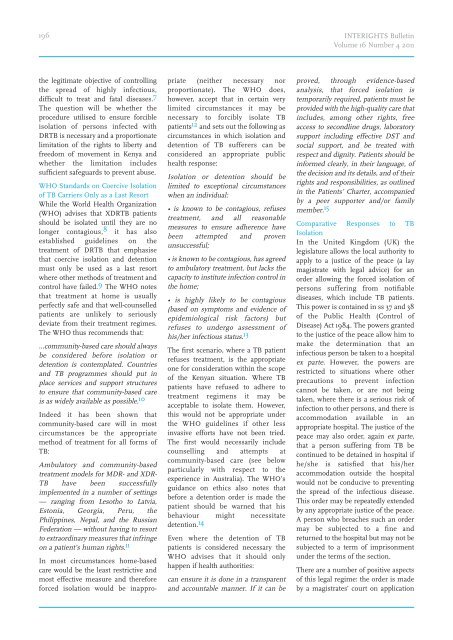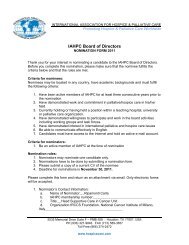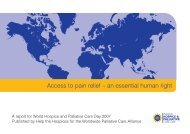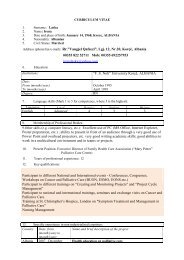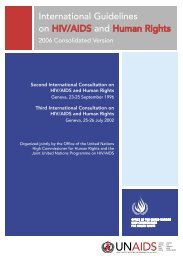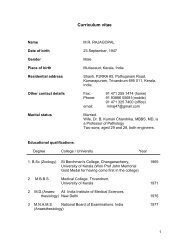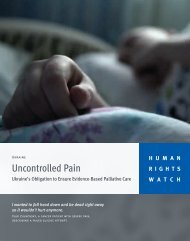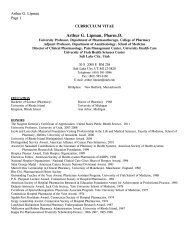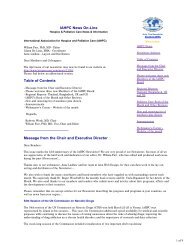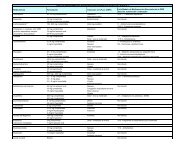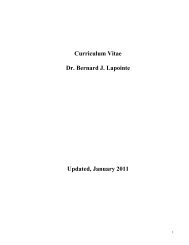INTERIGHTS Bulletin
INTERIGHTS Bulletin
INTERIGHTS Bulletin
You also want an ePaper? Increase the reach of your titles
YUMPU automatically turns print PDFs into web optimized ePapers that Google loves.
196 <strong>INTERIGHTS</strong> <strong>Bulletin</strong><br />
Volume 16 Number 4 2011<br />
the legitimate objective of controlling<br />
the spread of highly infectious,<br />
difficult to treat and fatal diseases. 7<br />
The question will be whether the<br />
procedure utilised to ensure forcible<br />
isolation of persons infected with<br />
DRTB is necessary and a proportionate<br />
limitation of the rights to liberty and<br />
freedom of movement in Kenya and<br />
whether the limitation includes<br />
sufficient safeguards to prevent abuse.<br />
WHO Standards on Coercive Isolation<br />
of TB Carriers Only as a Last Resort<br />
While the World Health Organization<br />
(WHO) advises that XDRTB patients<br />
should be isolated until they are no<br />
longer contagious, 8 it has also<br />
established guidelines on the<br />
treatment of DRTB that emphasise<br />
that coercive isolation and detention<br />
must only be used as a last resort<br />
where other methods of treatment and<br />
control have failed. 9 The WHO notes<br />
that treatment at home is usually<br />
perfectly safe and that well-counselled<br />
patients are unlikely to seriously<br />
deviate from their treatment regimes.<br />
The WHO thus recommends that:<br />
…community-based care should always<br />
be considered before isolation or<br />
detention is contemplated. Countries<br />
and TB programmes should put in<br />
place services and support structures<br />
to ensure that community-based care<br />
is as widely available as possible. 10<br />
Indeed it has been shown that<br />
community-based care will in most<br />
circumstances be the appropriate<br />
method of treatment for all forms of<br />
TB:<br />
Ambulatory and community-based<br />
treatment models for MDR- and XDR-<br />
TB have been successfully<br />
implemented in a number of settings<br />
— ranging from Lesotho to Latvia,<br />
Estonia, Georgia, Peru, the<br />
Philippines, Nepal, and the Russian<br />
Federation — without having to resort<br />
to extraordinary measures that infringe<br />
on a patient’s human rights. 11<br />
In most circumstances home-based<br />
care would be the least restrictive and<br />
most effective measure and therefore<br />
forced isolation would be inappro-<br />
priate (neither necessary nor<br />
proportionate). The WHO does,<br />
however, accept that in certain very<br />
limited circumstances it may be<br />
necessary to forcibly isolate TB<br />
patients 12 and sets out the following as<br />
circumstances in which isolation and<br />
detention of TB sufferers can be<br />
considered an appropriate public<br />
health response:<br />
Isolation or detention should be<br />
limited to exceptional circumstances<br />
when an individual:<br />
• is known to be contagious, refuses<br />
treatment, and all reasonable<br />
measures to ensure adherence have<br />
been attempted and proven<br />
unsuccessful;<br />
• is known to be contagious, has agreed<br />
to ambulatory treatment, but lacks the<br />
capacity to institute infection control in<br />
the home;<br />
• is highly likely to be contagious<br />
(based on symptoms and evidence of<br />
epidemiological risk factors) but<br />
refuses to undergo assessment of<br />
his/her infectious status. 13<br />
The first scenario, where a TB patient<br />
refuses treatment, is the appropriate<br />
one for consideration within the scope<br />
of the Kenyan situation. Where TB<br />
patients have refused to adhere to<br />
treatment regimens it may be<br />
acceptable to isolate them. However,<br />
this would not be appropriate under<br />
the WHO guidelines if other less<br />
invasive efforts have not been tried.<br />
The first would necessarily include<br />
counselling and attempts at<br />
community-based care (see below<br />
particularly with respect to the<br />
experience in Australia). The WHO’s<br />
guidance on ethics also notes that<br />
before a detention order is made the<br />
patient should be warned that his<br />
behaviour might necessitate<br />
detention. 14<br />
Even where the detention of TB<br />
patients is considered necessary the<br />
WHO advises that it should only<br />
happen if health authorities:<br />
can ensure it is done in a transparent<br />
and accountable manner. If it can be<br />
proved, through evidence-based<br />
analysis, that forced isolation is<br />
temporarily required, patients must be<br />
provided with the high-quality care that<br />
includes, among other rights, free<br />
access to secondline drugs, laboratory<br />
support including effective DST and<br />
social support, and be treated with<br />
respect and dignity. Patients should be<br />
informed clearly, in their language, of<br />
the decision and its details, and of their<br />
rights and responsibilities, as outlined<br />
in the Patients’ Charter, accompanied<br />
by a peer supporter and/or family<br />
member. 15<br />
Comparative Responses to TB<br />
Isolation<br />
In the United Kingdom (UK) the<br />
legislature allows the local authority to<br />
apply to a justice of the peace (a lay<br />
magistrate with legal advice) for an<br />
order allowing the forced isolation of<br />
persons suffering from notifiable<br />
diseases, which include TB patients.<br />
This power is contained in ss 37 and 38<br />
of the Public Health (Control of<br />
Disease) Act 1984. The powers granted<br />
to the justice of the peace allow him to<br />
make the determination that an<br />
infectious person be taken to a hospital<br />
ex parte. However, the powers are<br />
restricted to situations where other<br />
precautions to prevent infection<br />
cannot be taken, or are not being<br />
taken, where there is a serious risk of<br />
infection to other persons, and there is<br />
accommodation available in an<br />
appropriate hospital. The justice of the<br />
peace may also order, again ex parte,<br />
that a person suffering from TB be<br />
continued to be detained in hospital if<br />
he/she is satisfied that his/her<br />
accommodation outside the hospital<br />
would not be conducive to preventing<br />
the spread of the infectious disease.<br />
This order may be repeatedly extended<br />
by any appropriate justice of the peace.<br />
A person who breaches such an order<br />
may be subjected to a fine and<br />
returned to the hospital but may not be<br />
subjected to a term of imprisonment<br />
under the terms of the section.<br />
There are a number of positive aspects<br />
of this legal regime: the order is made<br />
by a magistrates’ court on application


